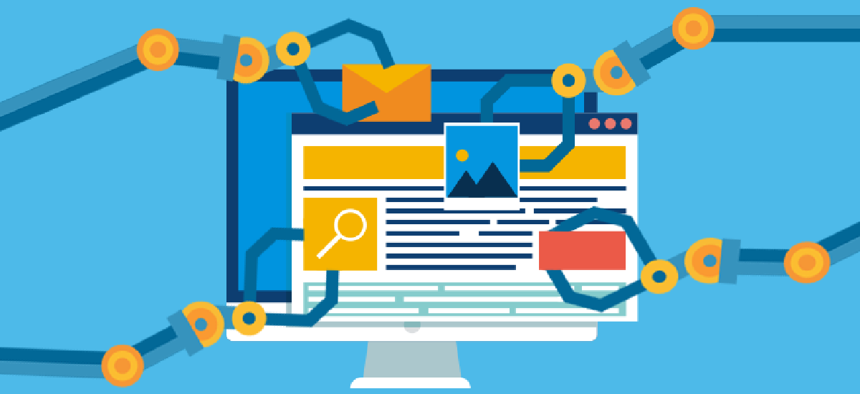Connecting state and local government leaders
Robotic process automation can help agencies meet the core objectives outlined in the President's Management Agenda: increased efficiency, effectiveness and transparency.
For the past several years, IT modernization has become a top priority for federal agencies. Now that the Modernizing Government Technology Act has officially been signed into law and the White House has called upon agencies to apply for modernization funding, opportunities to upgrade legacy systems are arising.
“Federal agencies will shift time, effort and funding currently spent performing repetitive administrative tasks and complying with unnecessary and obsolete policies guidance, and reporting requirements, toward accomplishing mission outcomes, with the objective of achieving no new net burden annually,” the administration said in the President’s Management Agenda. This renewed attention on mission outcomes, along with the allocation of additional resources, will enable agencies to finally put their plans -- spanning from workforce issues to enhanced efficiency -- into action and move closer to achieving their long-standing goals.
As federal agencies act on the administration’s guidance and accelerate their initiatives, robotic process automation presents a valuable approach to automating high-volume, repeatable and often simple process tasks. It provides a mechanism to streamline business processes and identify opportunities where automation can result in cost savings. RPA delivers immediate value to the business mission while overcoming integration barriers with current legacy systems.
Leveraging RPA to enhance the business process
All too often, federal workers spend their time on repetitive tasks that keep them from addressing the highly complex challenges that arise. Whether its medical personnel reviewing clinical data or a legal expert collecting information to process a citizen’s benefits or appeals claim, employees are tasked with extracting relevant information from multiple systems in order to create a comprehensive profile. With an RPA implementation, agencies can collect this information within minutes (and even seconds), with increased accuracy, allowing staff to spend their time and resources reviewing and analyzing data, rather than doing simplistic tasks like gathering it and entering it into a system.
RPA can also help agencies quickly expedite processes to help manage and reduce growing backlogs, such as the 640,000 FOIA requests that have not yet been processed. Because it can typically perform transactions more quickly and with fewer errors than a human, RPA is effective in decreasing the handling time for many business processes.
Critical factors to a successful RPA implementation
The success of an RPA implementation is predicated on a few key aspects, including process understanding and re-engineering, culture shift enablement, quantitative measurement and use of a sound RPA platform.
An RPA implementation should begin with determining how the technology can streamline business processes, ascertaining the necessary operational elements and identifying repeat tasks that can be programmed and executed by it. The challenge is to ensure a clear understanding of the business processes and establish quantitative measures that will validate the overall effectiveness of the project. As RPA is a business-led initiative, organizational change and readiness management is critical for adoption. Shifting much needed human talent over to performing high-value functions results in increased performance, higher job satisfaction, better use of human capital and an overall improvement of service delivery.
RPA and AI: Analyzing the key differences
While RPA has become an increasingly popular topic of discussion among technology leaders, it is often used in conjunction with other related, trending technologies. On the surface, federal IT decision makers have embraced RPA across the federal landscape, but some are discussing RPA in conjunction with artificial intelligence. This is causing a tremendous amount of confusion when it comes to defining RPA’s independent value and role as a differentiator.
Although there was some overlap between RPA and AI when they were first introduced, these dynamic tools have diverged in two major ways. RPA automates repetitive, high-frequency and mundane functions that were previously performed manually. On the other hand, AI is applied to complicated processes that involve decision-making. Although some AI applications require a level of human intervention to facilitate successful completion of functions, most are based through training and machine learning. Simply put, RPA performs like a trained robot (as its name implies) and an AI platform functions more like a human.
While RPA records and replicates the information that’s being analyzed, it requires little or none of the intelligence and interpretation that AI requires. Instead, it takes uniform transactions and serves as the “human hand” in completing them – without the need for heavy integration. The configuration of RPA is also extremely unique, as federal IT developers can design the framework to perform exactly as they want. Alternatively, AI requires cognitive analysis as it learns how to operate and leverages this information to perform more effectively over an extended period of time.
A valuable tool for modernization initiatives
As the federal government undergoes an extensive digital transformation, agencies will be poised to leverage RPA to maximize their modernization outcomes and meet the core objectives outlined in the PMA: drive increased efficiency, effectiveness and transparency. In order to be successful, it’s imperative that users understand RPA’s unique qualities and properly implement it to achieve success. Through RPA, agencies can achieve positive outcomes from modernization initiatives and improve their delivery of services to citizens.



